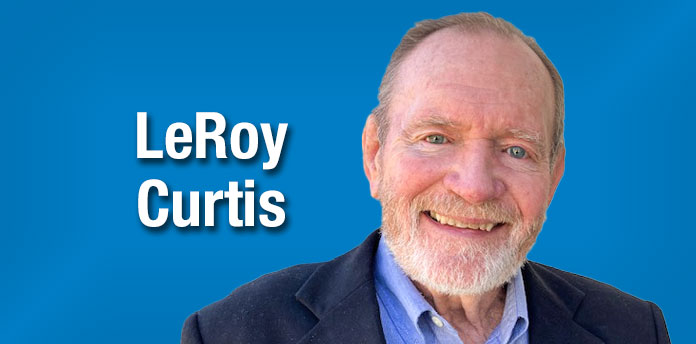A few years ago a protest movement was initiated by a loose network of political agitators who wanted to undermine what they perceived as the unfair capitalistic system that has actually been the main reason for our historic prosperity.
Someone decided to call the movement “Occupy.” The idea was that an unruly mob, by its sheer numbers, could potentially shut down Wall Street, selected industries, and local government with which the movement leaders disagreed. The masses of protesters included communists, anarchists, and a few young rabble-rousers just looking for a cause.
While I didn’t agree with the methods employed by the protesters, or most of their objectives, I did share some of their frustrations with corporate greed and unjust business practices.
Currently, it seems as if public protests over just about anything have multiplied and intensified to a breaking point. Nobody seems to be happy about anything. The turbulent political climate, inflation, and increasing lawlessness have exacerbated our bad national mood. These are indeed tough times, socially and economically. Mounting public dissatisfaction and anger are the results.
Unfortunately, as times get more difficult, far too many people are becoming increasingly dependent on government assistance, even though our country is drowning in red ink already. Nevertheless, the American people, including Christians, continue to look to Uncle Sam to provide them with the prosperity and security to which they think they are forever entitled. And why wouldn’t they? A few generations have grown up with that being the norm.
Freedom requires responsibility. Dependency on government erodes freedom. As Thomas Jefferson once said, “A government that is large enough to give you everything you want is also large enough to take away everything you own.”
The main problem with looking to our political leaders for help is that they are out of both money and ideas. Taxes on the “rich” and new regulations on commerce are, at best, counterproductive to prosperity.
The more government involves itself in the private affairs of its citizens, the more unproductive those citizens become. Something will soon have to give or there will be an epic systematic failure of every major American institution.
Some Christians see the dire set of circumstances that is destroying our economy as the first pangs of a coming apocalypse. Perhaps they are right. Some see the need to “circle the wagons,” arm ourselves, and hoard supplies in order to be ready when the “bad guys” come around, whoever they might be. Maybe they are right as well.
Still, others think that because this or that biblical prophecy (usually taken out of context) seems to fit our current state of affairs, we are in the Last Days. I guess that is a real possibility too.
In any case, Jesus warned us not to panic, but to look up toward our hope, and not around at the troubles of the world that he promised we would have to overcome. Christians can talk all they want about end-time situations and how to prepare for their personal survival when things start unraveling. However wise that may seem, it just possibly might be the wrong approach.
Before anyone strongly reacts to my statement, consider for a moment that this could be the Church’s golden opportunity to make the difference that it was created to make. Could this be the beginning of a new age, whereby believers rally around their King and begin to manifest, as much by deeds as by words, the Kingdom of God?
Unfortunately, Christians seem to be apt at missing opportunities. I think that’s due to the fact that even we have been infected by a defective worldview that rejects the absolute authority of the Word of God and displaces it with relativism, the philosophy that espouses the conviction that every theory or idea has equal validity to any others.
That can sound appealing to independent Christian thinkers who embrace universalism. After all, Jesus loves us regardless of how badly we behave. He wouldn’t send anyone to hell. Obedience to biblical principles is therefore rejected as fundamentalistic legalism, these thinkers say
With no true moral compass, even Christians can get lost. The tragic fact is that the world has done a much better job of “evangelizing” the Church than the Church has the world. Everybody seems to be doing what is right in his own eyes (Judges 17:6), regardless of what he says he believes.
The Truth gets buried in a dung heap of excuses for our blatant disobedience and neglect when it comes to Christ’s commands. Do we really love Him enough to alter our lives to reflect it? That is not a rhetorical question.
Being a Bible-believing Christian is extremely difficult in the current cultural climate. We are despised and ridiculed by our enemies. Yet, the Word confines us to live according to principles that restrain our natural inclination to retaliate violently against those who repress and mock us for our “backward” dependence on a God the world says only exists in our imagination.
We are required to hold our tongues when we are accused of being the cause of hatred, bigotry, and nearly every social ill that visits the world.
God nevertheless requires us to love our enemy … feed him and comfort him. That’s a tough one for an old sailor like myself. It would be easy to throw in the spiritual towel and to fight fire with fire. However, I know too well that the anger of men is counterproductive to the grace of God. Jesus has called us to a higher way. In the face of the current turmoil, he commands us to “occupy” until he returns.
In Luke, chapter nineteen, Jesus tells the parable of the servants sent ahead of a king to invest wisely. He charged them to make it work. Two did and were rewarded. One did not and was punished. In verse thirteen the servants were told to “occupy.” The word in Greek means basically to busy oneself with the task at hand. In this parable that was to prepare the way for the coming King.
That is exactly what the Church needs to be doing today. We should apply all of our God-given resources toward reconciling the world to God through Jesus Christ (2 Corinthians 5:18-20). To this end, it is absolutely vital that we regroup and consider just what kind of people we need to be.
In the words of the apostle Peter, “But you are a chosen people, a royal priesthood, a holy nation, a people belonging to God, that you may declare the praises of him who called you out of darkness into his wonderful light. Once you were not a people, but now you are the people of God; once you had not received mercy, but now you have received mercy. Dear friends, I urge you, as aliens and strangers in the world, to abstain from sinful desires, which war against your soul. Live such good lives among the pagans that, though they accuse you of doing wrong, they may see your good deeds and glorify God on the day he visits us. (1 Peter 2:9-12).
Let us press on in faith and occupy ourselves in preparation for the King’s return.
God bless you.
[LeRoy Curtis is a graduate of the University of North Carolina, Chapel Hill, and Asbury Theological Seminary. He served four years as a U.S. Naval Officer after which he became a pastor, Bible professor, educator, author, and missionary living in E. Africa for eight years where he and his wife developed a curriculum of biblical studies for untrained pastors in rural Kenya. His passion for training young church leaders takes him to various parts of the U.S., Latin America, and Africa. He and Judy are currently residing in Carrollton, Georgia.]











Leave a Comment
You must be logged in to post a comment.